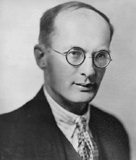If science is “a body of rules and conceptions, based on experience and derived from it by logical inference” then primitive people, both ancient and modern, have rudimentary science. Organized hunting, fishing and tilling could not have taken place without careful observation and understanding of the regularities of nature.
Early man seeks above all to control the course of nature for practical ends. Through rite and spell he seeks to compel weather, animals and crops to obey his will. Later, finding the limitations magic he turns, in fear or hope, to ancestor-spirits or gods.
Magic is akin to science in that it is based on man’s confidence that he can dominate nature directly, if only he knows the proper rules or laws. Religion begins when direct human control fails and then supplication is made to ‘higher beings’ or ‘powers’ for the intercession desired.
There is interest in the magical even for the modern mind. Realization of impotence in the face of implacable nature drives humans to anger and action. Obsessive desire, passion or fear also move humans to some activity. They utter some words, form some mental images; these take on objective reality and, as the emotions ebb, those words and images become the substance of ritual and rite.
Magic seems to stir up in everyone, ancient or modern, some lingering hopes in the miraculous, some dormant belief in man’s mysterious possibilities. The function of magic is to ritualize man’s optimism, to enhance his faith in the victory of hope over fear.


